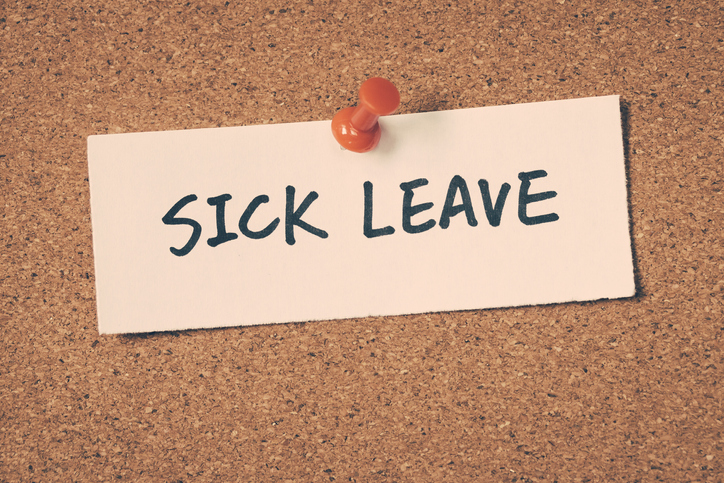
Out of Sight Should Not Mean Out of Mind for Employees on Sick Leave
July 15, 2019, by HR à la carte | Work Environment and Policies

In our practice we’ve noticed an increasing trend across industries where employees go off on sick leave with little to no communication with their employer. And often employers do not follow up with them to find out how long they will be away. This is problematic in many ways. With little to no information, assumptions can be made about the reasons the employee went off on leave, and for how long, and their intentions to return or not. Sometimes employers will assume they’ve abandoned their jobs, or that they’ve resigned. And it is very difficult to manage the business if you don’t know how long you need to backfill a role temporarily.
An ideal process would be as follows to mitigate any risk with regards to improperly handling an employee absence due to illness and assuming they’ve left their position:
- As soon as you become aware that an employee is off on sick leave, send them a letter outlining your sick leave policy and any sick leave benefits the company offers. If there are no sick leave benefits, at least outline how they can go about applying for EI Sickness Benefits. Also, be sure to include an employee medical form that they can get their physician to fill out with information on their prognosis (not diagnosis), potential return to work date, and what, if any, accommodations need to be made upon their return and for how long. Be sure to include a date as to when you would like to receive this information.
- If you have not heard back from the employee past the deadline date, try calling their emergency contact to find out what has happened and follow up with another letter, again reiterating the need for information so that you can determine the best course of action to assist them on their leave and to manage the business in their absence. Again, provide a deadline.
- If you have heard back from them, and have received the medical form, ensure you understand the contents of the form and what it means for your business. If in doubt, you can call the physician for clarification for the purposes of understanding any accommodations required upon return. There may be other assessments scheduled by the physician at certain intervals. If there is any change in the prognosis, the employee needs to make you aware, particularly if the return to work date changes as a result.
- Prior to the return to work date, work with the employee on an appropriate accommodation plan and schedule. Ensure this is documented and signed off on by both the employee and the physician. You can have the employee provide a copy of their job description to their physician, so s/he understands both the physical and psychosocial aspects of the job.
- When the employee returns to work, ensure the accommodation plan is followed and that either regular meetings are held with the employee to continue to support him/her in his/her recovery until the physician deems the employee is fully fit for 100% duties.
Never:
- Assume no news is good news
- Assume the employee is not coming back or has resigned
- Pressure an employee to return before their doctor deems them ready to return to work
Always:
- Provide written documentation throughout the process
- Provide support to an employee on sick leave
- Follow up with both the employee and/or their physician should you have any questions or concerns
Many employees do not realize that accommodation is a two-way communication process. Employees have a duty to do the following as per the Ontario Human Rights Commission:
- make accommodation needs known to the best of their ability, preferably in writing, so that the person responsible for accommodation can make the requested accommodation
- answer questions or provide information about relevant restrictions or limitations, including information from health care professionals, where appropriate and as needed
- take part in discussions about possible accommodation solutions
- co-operate with any experts whose assistance is required to manage the accommodation process or when information is needed that is unavailable to the person with a disability
- meet agreed-upon performance standards and requirements, such as job standards, once accommodation is provided
- work with the accommodation provider on an ongoing basis to manage the accommodation process
- discuss his or her disability only with persons who need to know.
Remember that sick leave is a protected leave and that the employee’s job needs to be held for them until their return. Disabilities are also a protected status under human rights laws across the country. Ignoring an employee who is off on sick leave, or worse, assuming they have resigned or abandoned their job is not the way to go. Your employees also have a duty to keep you informed of their prognosis and return to work date.
As always, when in doubt as to how to handle an employee absence, work with your trusted HR professionals who can help you navigate through these sometimes complex situations.
Other Items of Interest:
Can I Fire My Employee While They Are on Sick Leave?
Coping with Employee Mental Health Issues
The Dos and Don’ts of Managing Employees Pre- and Post-Maternity Leave
3 Tips on How to Handle an Employee’s Absence Due to Illness
Free HR News and Tips for Canadian Employers
Our HR newsletters help keep you up to date on managing employees in Canada
Free HR News and Tips for Canadian Employers
Join other Business Owners and HR professionals who want to stay up to date on the latest HR news and get helpful tips and resources.
×